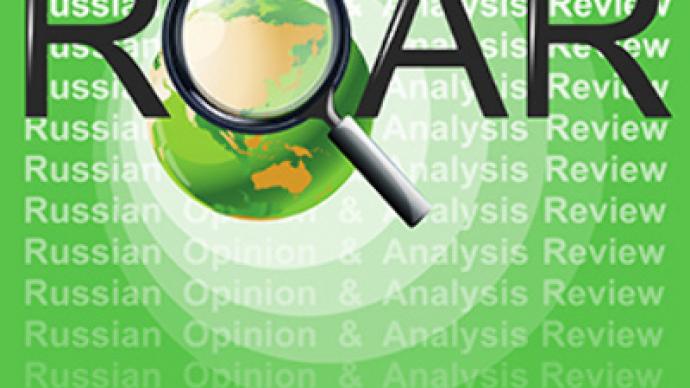ROAR: Yanukovich visits Moscow for second time in a month

The presidents of Russia and Ukraine have discussed bilateral issues during the second meeting in a month as Viktor Yanukovich is abolishing commissions responsible for developing closer ties with NATO.
President Dmitry Medevdev met on April 5 with his Ukrainian counterpart who was on a one-day private visit in Moscow. Not only talks were on the schedule, as the two presidents visited a chapel and took a ride in Medvedev’s white 1948 Pobeda car.
The Ukrainian leader came to Moscow for the second time after he became president in February. This time he attended the baptism of his former schoolmate's grandson and visited the grave of cosmonaut Georgy Beregovoy in the Novodevichy cemetery to honor “the memory of a man who played a significant role” in his life. Yanukovich also met with Patriarch Kirill of Moscow and All Russia.
The private visit was followed by a working meeting with the Russian president, Kommersant daily noted, adding that the media did not obtain many details of the talks between the two heads of state.
Medvedev and Yanukovich will meet next time in Kiev during a meeting of the intergovernmental commission. It will be the first Medvedev’s visit to Ukraine as president, the paper said. Russian Foreign Minister Sergey Lavrov is expected to visit Ukraine at the end of this week to prepare for the meeting.
Meanwhile, Yanukovich’s first decisions as president justify the expectations of many observers. Prior to his visit to Russia, on April 2, he dismissed an inter-agency commission on the preparation of the country’s accession to NATO. He also dissolved the national center for Euro-Atlantic integration.
Yanukovich earlier made it clear that the accession to NATO was not on his country’s agenda. At the same time, the Ukrainian president said he would continue all cooperation programs with the alliance and fulfill the earlier agreements. Ukraine is also supporting Russia’s initiative on creating a new European security system.
The Ukrainian president also took these steps on the eve of his state visit to Washington, Izvestia daily noted. “If you recall Yanukovich’s previous statements on the non-aligned status of Ukraine, it is becoming clear that Kiev is changing its foreign policy vector and rejects the perspectives of joining the alliance.”
Several institutions “conceived by then-President Viktor Yushchenko to amuse his American partners,” such as the institutes on national and international security will be also eliminated, the paper said.
“Along with them coordination councils and panels of experts that study relations between Ukraine and NATO will disappear,” the daily noted. The orders were already published on the president’s website and became effective.
“Ukraine is abandoning Yushchenko’s heritage,” Rossiyskaya Gazeta daily said, adding that Yanukovich has closed most consultative bodies created under the former president. The former leader, facing constant confrontation with the parliament, had to establish duplicate organs, the paper noted.
Yanukovich, who has successfully consolidated executive and legislative powers, is abolishing these bodies, including those dealing with the NATO issues, the daily noted.
“The new leadership made it clear immediately that it likes more non-bloc status of Ukraine, and the discussion about the accession of NATO is at least untimely,” the paper said. “Not only was the commission under the president eliminated, but the same structure under the Cabinet of Ministers.”
Commenting on Yanukovich’s foreign policy, many observers mention former President Leonid Kuchma. During his era, in 1994-2005, Ukraine had friendly relations with all countries, Ogonek weekly said. “Thanks to this, no serious initiative such as ‘Euro-Atlantic vector of development and participation in NATO missions did not spark indignation from Russia.”
During Yushchenko’s presidency, co-operation with the European Union became a priority, and the application for NATO membership was not submitted only because the alliance itself did not want to take this responsibility, the weekly said. Now times have changed, and Kiev is saying again that “all serious foreign policy players are equally useful’ for Ukraine,” it noted.
At the same time, Ukraine has not determined its attitude toward the Customs Union of Russia, Belarus and Kazakhstan, observers say. “Yanukovich had to refute the statement on humanitarian issues of Deputy Prime Minister Vladimir Seminozhenko, who said the idea of joining the Customs Union would be considered by the government,” Politcom.ru website said.
Yanukovich stressed that the deputy prime minister had no right to make such a statement, the website noted. The president added that Ukraine is “on the path of active integration into the European Union,” which had been underlined in his statements. Later, Seminozhenko himself repudiated his words.
It is not ruled out that Yanukovich wanted to explain his statement to the Russian leadership during his private visit, Moskovsky Komsomolets daily said. He has more reasons for contacting Russian officials than Kuchma, the paper noted, citing Ukraine’s economic problems. It recalled the recent visit of Ukrainian Prime Minister Nikolay Azarov who unsuccessfully tried “to beat down the price for Russia’s gas.”
The Ukrainian leader has to “calm down” his ministers “who has a more pro-Russian position than the president himself,” political observer Svetlana Samoylova wrote on Politcom.ru, adding that Azarov is also known as a supporter of joining the Customs Union.
The existence of this problem generates two negative factors for Yanukovich, the analyst believes. First, his ministers will face constant pressure and criticism from opposition, and, second, criticizing an “essentially too pro-Russian position,” Yanukovich “takes the risk of provoking Moscow’s irritation,” she added.
At the same time, Kiev may go in the direction of Russia’s in another issue by rescinding the former president’s order to declare Stepan Bandera a Hero of Ukraine, analysts note. In doing so, the authorities will also please many voters in Ukraine and politicians in the West who opposed awarding the title of hero to the Nazi collaborator.
Sergey Borisov, RT
Russian Opinion and Analytics Review














